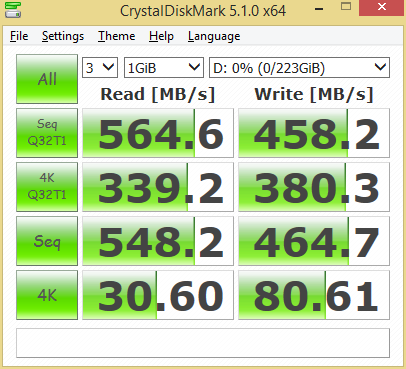CRYSTAL DISK BENCHMARK VER. 4.0.3 X64
Crystal Disk Benchmark is used to measure read and write performance through sampling of random data which is, for the most part, incompressible. Performance is virtually identical, regardless of data sample so we have included only that using random data samples.
240GB
Next up in Crystal Disk Mark we can see the PNY CS2211 was able to achieve maximum sequential performance of 564MB/s read and 458MB/s write for the 240GB model and 562MB/s read and 544MB/s write for the 480GB. On the 4K section we can see a high of nearly 31MB/s for read and almost 82MB/s for write, which is a bit slower than we were hoping for.
The toughest benchmark available for solid state drives is AS SSD as it relies solely on incompressible data samples when testing performance. For the most part, AS SSD tests can be considered the ‘worst case scenario’ in obtaining data transfer speeds and many enthusiasts like AS SSD for their needs. Transfer speeds are displayed on the left with IOPS results on the right.
240GB
480GB
During our AS SSD benchmarks we can see that the 480GB model has a very slight lead over the 240GB model due to its faster sequential write speed. Overall, the 240GB model reached 1181 points while the 480GB model reached 1202 points! These results are very good! Both drives reach 527MB/s read and 240GB mode reaches 436MB/s write while the 480GB mode reaches just over 500MB/s. 4K QD1 performance is about 35-37MB/s read and 71MB/s write. Access times (latency results) are also very good. During the Copy benchmark, both drives delivered impressive results as well.
ANVIL STORAGE UTILITIES PROFESSIONAL
Anvil’s Storage Utilities (ASU) are the most complete test bed available for the solid state drive today. The benchmark displays test results for, not only throughput but also, IOPS and Disk Access Times. Not only does it have a preset SSD benchmark, but also, it has included such things as endurance testing and threaded I/O read, write and mixed tests, all of which are very simple to understand and use in our benchmark testing.
240GB
Finally, in Anvil we see that the performance is in line with what we have seen in the other tests. Overall, the CS2211s reached total scores in the nearly 4,900 point range which, again, is very good. Let’s continue on and see how these drives handle our more realistic PCMark test suites.
 The SSD Review The Worlds Dedicated SSD Education and Review Resource |
The SSD Review The Worlds Dedicated SSD Education and Review Resource | 


G’day Sean
Seems the same Phison made drive with 19nm flash is faster,
and possibly cheaper………….
https://www.tomshardware.com/reviews/zotac-premium-edition-ssd,4397-3.html
Hi, yes we are in the process of aquiring one of those drives for review as well! Thanks!
Glad to see reviews again instead of announcements. But It amazes me how these companies advertise their new ssds with so much enthusiasm, when there new ssds are slower than the previous generation. It’s like, yeah we shrunk the nand size again, Woopie!!! And now it’s a little slower but almost as fast.
As long as it performs adequately and the endurance/retention is reasonable, there is nothing wrong. After all, each generation is getting cheaper.
Does this performs better that Samsung 850 Pro and Crucial M550? I am lost which to choose…
Ugh, all the graphs have two SSDs using the white line. which one is which ?
You say this is a TLC Nand but the official website says its an MLC https://www.pny.com/ssd-cs2211 I am going crazy here. Anandtech also says its an MLC.
Well I am going crazy cause many people are saying that TLC drives come in 120/240 capacities and only the MLC come in 128/256 and so on capacities.
I have seen uptill now two brands that have the 120/240 capacites but claim to be MLC one is PNY and the other is Chiprex. So I am confused. These are really cheap but I don’t want it if its a TLC Could someone please confirm
TLC -is- MLC
MLC = Multiple-level cell
TLC = Triple-level cell
Multiple means more than one.. 3 is more than one.
MLC usually means 2 levels per-cell, but manufacturers can sometimes label TLC as MLC.